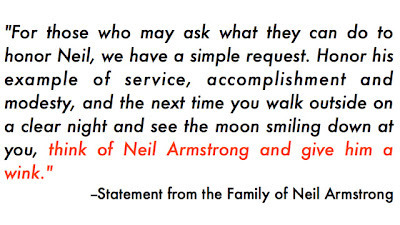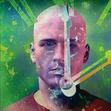Marty Halpern's Blog, page 34
December 3, 2012
"Suzy? Suzy Creamcheese?"
In memory of...
FRANK ZAPPA
Dec 21, 1940 – Dec 4, 1993
"Eating TV dinners by the pool, I'm so glad I finished school..."
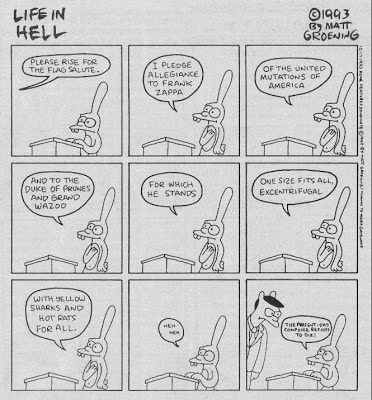
And, from my personal collection:
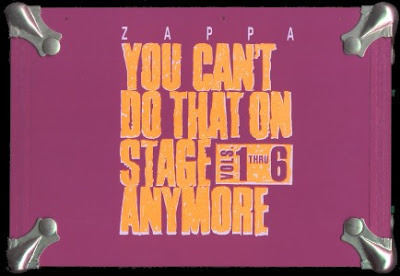
The 6-volume DVD (12 discs) Wooden Box Set


FRANK ZAPPA
Dec 21, 1940 – Dec 4, 1993
"Eating TV dinners by the pool, I'm so glad I finished school..."

And, from my personal collection:

The 6-volume DVD (12 discs) Wooden Box Set

Published on December 03, 2012 09:53
November 2, 2012
Writing 101: Self-Editing Notes and Resources
This weekend (November 2-4) I will be participating in the first Convolution convention, to be held at the Hyatt Regency San Francisco Airport Hotel in Burlingame, California. So if you just happen to be in the neighborhood, please do stop by and join the festivities.
I am moderating a panel on "Self-Editing" at 6:00 PM on Saturday (tomorrow) in the Sandpebble-A room. While reviewing notes, online resources, etc. in preparation for this panel discussion --
I decided to write down these notes and links and such here, on More Red Ink, as a way of gathering my thoughts, and providing a virtual resource to the panel attendees. This way I can simply point the audience to this blog post and not have to worry about spelling out web links, names, and such during the actual panel discussion.
So, let me begin by saying that what follows are strictly notes, quotes, links, bullet points, etc. No fancy paragraphs and flow; these are literally reference notes for the panel discussion. However, if you are a writer, then by definition you are a self-editor, and you may find some of what follows of interest in your pursuit of perfection and publication.
* * * * * * * * * *
Recommendation:
Self-Editing for Fiction Writers, Second Edition: How to Edit Yourself Into Print by Renni Browne and Dave King (William Morrow Paperbacks).
by Renni Browne and Dave King (William Morrow Paperbacks).
References:
Alan Cooper's List of Homonyms: words that have the same sound and often the same spelling but differ in meaning; a wonderful list of homonyms, but the list is old (1997) -- though words don't really change, do they.
Eclectics.com: "Self-Editing" by Lori Handeland.
1. Are you telling instead of showing?
2. Are you establishing your character gradually and unobtrusively?
3. Is your point of view consistent?
4. Are your dialogue mechanics sophisticated? (reflect adequate knowledge of proper writing technique)
5 Have you checked for breaks?
6. Have you checked for unintentional repetition?
7. Have you checked for sophistication throughout the novel?
8. Have you checked your general mechanics?
Each bullet point has excellent content with examples.
The Chronicle of Higher Education: "Before You Submit: Some Tips for Self-Editing" by Carol Saller.
Things Writers Miss:
- Throat-clearing
- Personal tics
- Repetition
- Non sequiturs
Things Writers "Correct" Needlessly:
- The passive voice
- Use of the first person
- Split infinitives
WOW-WomenOnWriting.com: "Red Pencil Round-up: Self-Editing for Fiction Writers" by Annette Fix.
1. Narrative
- Backstory/Exposition
- In Media Res
- Bread Crumb Trail
- Show, Don't Tell
- Balance
- Voice
- Clichés and Idioms
Excellent before-and-after examples.
2. Characterization
- Introduction
- Names
- Goals
- Motivation
3. Dialog
- Subtext vs. On the Nose
- Foul Ball
- Character Voice
- Tags
4. Setting/Imagery
- Sensory
- Grounding
5. Plot
- Cause & Effect
6. Research
7. Grammar
- Weak Verbs
- Infinitive
- Passive Voice
- Ambiguity
- Filler Words
More good before-and-after examples.
8. Punctuation
9. Pre-Submission Proof
- Spell Check
- Audio
Let's Get Digital blog: "Self-Editing: Back to Basics, Part I" by Karin Cox.
The first three things I notice in a new manuscript that hint an author is still learning the craft:
1. Wonderfully florid, flamboyant, descriptive and wordy verbiage
2. Comma Calamities
3. Modifiers Gone Mad
Let's Get Digital blog: "Self-Editing: Back to Basics, Part II" by Karin Cox.
More issues I regularly see in manuscripts submitted by novice authors:
1. Dialogue Dilemmas
2. Expository Dialogue
3. Um, Err, How’s the Weather
4. Throw the "Said Book" at Them
5. Name Dropping
Excellent (often over-the-top) examples in both part I and II; plus a brief discussion at the end on often mixed-up homonyms.
Note:
And always -- always! -- read the comments posted to these blogs. The comments often provide additional examples, resources, references, etc.


I am moderating a panel on "Self-Editing" at 6:00 PM on Saturday (tomorrow) in the Sandpebble-A room. While reviewing notes, online resources, etc. in preparation for this panel discussion --
I decided to write down these notes and links and such here, on More Red Ink, as a way of gathering my thoughts, and providing a virtual resource to the panel attendees. This way I can simply point the audience to this blog post and not have to worry about spelling out web links, names, and such during the actual panel discussion.
So, let me begin by saying that what follows are strictly notes, quotes, links, bullet points, etc. No fancy paragraphs and flow; these are literally reference notes for the panel discussion. However, if you are a writer, then by definition you are a self-editor, and you may find some of what follows of interest in your pursuit of perfection and publication.
* * * * * * * * * *
Recommendation:
Self-Editing for Fiction Writers, Second Edition: How to Edit Yourself Into Print
 by Renni Browne and Dave King (William Morrow Paperbacks).
by Renni Browne and Dave King (William Morrow Paperbacks).References:
Alan Cooper's List of Homonyms: words that have the same sound and often the same spelling but differ in meaning; a wonderful list of homonyms, but the list is old (1997) -- though words don't really change, do they.
Eclectics.com: "Self-Editing" by Lori Handeland.
Self editing is a very important aspect of re-writing. It is the last thing a writer does before sending the manuscript off to their agent or an editor. I look at self-editing as a final housecleaning chore. Not a lot of fun in itself, but don't you feel good when you're done?
I always do a final edit with a hard copy. There are so many things you won't see by reading your manuscript off a computer screen--beside the problem of going blind from reading an entire book that way. The printed word needs to be read, as it was meant to be read, on paper, so you can see the mistakes--and hear any with your inner ear. There is a flow that comes with a well written, well rewritten, well edited manuscript that you can hear when you read it. You must also be able to see your work as an editor or agent will see it. Too much introspection or narrative all in a row with no breaks for dialogue or adequate paragraphing makes a reader skip ahead for some excitement. Sometimes you don't notice this until you read your hard copy in the self-editing stage.
1. Are you telling instead of showing?
2. Are you establishing your character gradually and unobtrusively?
3. Is your point of view consistent?
4. Are your dialogue mechanics sophisticated? (reflect adequate knowledge of proper writing technique)
5 Have you checked for breaks?
6. Have you checked for unintentional repetition?
7. Have you checked for sophistication throughout the novel?
8. Have you checked your general mechanics?
Each bullet point has excellent content with examples.
The Chronicle of Higher Education: "Before You Submit: Some Tips for Self-Editing" by Carol Saller.
Things Writers Miss:
- Throat-clearing
- Personal tics
- Repetition
- Non sequiturs
Things Writers "Correct" Needlessly:
- The passive voice
- Use of the first person
- Split infinitives
WOW-WomenOnWriting.com: "Red Pencil Round-up: Self-Editing for Fiction Writers" by Annette Fix.
Effective self-editing requires you to have laser focus on each story element and how it functions technically within the whole manuscript. Something to remember: you’re not creating the story; you’re analyzing it and making it better.
1. Narrative
This is where you need to be ruthless with your editing. The modern reader is busy and easily distracted, so you have a limited amount of time to pull her into your story, keep her captivated by your complex characters, and make her want to find out what happens next in your plot.
- Backstory/Exposition
- In Media Res
- Bread Crumb Trail
- Show, Don't Tell
- Balance
- Voice
- Clichés and Idioms
Excellent before-and-after examples.
2. Characterization
- Introduction
- Names
- Goals
- Motivation
3. Dialog
- Subtext vs. On the Nose
- Foul Ball
- Character Voice
- Tags
4. Setting/Imagery
- Sensory
- Grounding
5. Plot
- Cause & Effect
6. Research
7. Grammar
- Weak Verbs
- Infinitive
- Passive Voice
- Ambiguity
- Filler Words
More good before-and-after examples.
8. Punctuation
9. Pre-Submission Proof
- Spell Check
- Audio
Let's Get Digital blog: "Self-Editing: Back to Basics, Part I" by Karin Cox.
Let me start off by stating that there is no such thing as self-editing to a publishable level (at least not without a team of skilled beta readers); I would say this even if my livelihood did not depend on editing. I scour my own text for errors before I submit it to my publisher, but I am still always surprised at what my in-house colleagues pick up when they read through my manuscripts. As much as writers attempt to edit their own work, and should for the purposes of enhancing their drafts, I firmly believe they are incapable of doing so as effectively as a professional editor because they lack the necessary objectivity to assess their own writing.
The human brain also employs all kind of tricks to convince writers that what they put down on the page is correct (if not Man Booker Prize material). Taht yuo cna raed tihs at lal is prcaticlaly a mriacle! But such is the power of the human brain. Read a whole paragraph of that and soon you'll be able to wade through even the most atrocious, unedited drivel and make perfect sense of it. It is little wonder that most authors—even those who are competent self-editors at a draft level—miss a few transposed letters, misspelled words, homonyms, or misplaced modifiers. It's all thanks to the human brain's excellent ability to decode and process what the eyes see.
The first three things I notice in a new manuscript that hint an author is still learning the craft:
1. Wonderfully florid, flamboyant, descriptive and wordy verbiage
2. Comma Calamities
3. Modifiers Gone Mad
Let's Get Digital blog: "Self-Editing: Back to Basics, Part II" by Karin Cox.
More issues I regularly see in manuscripts submitted by novice authors:
1. Dialogue Dilemmas
2. Expository Dialogue
3. Um, Err, How’s the Weather
4. Throw the "Said Book" at Them
5. Name Dropping
Excellent (often over-the-top) examples in both part I and II; plus a brief discussion at the end on often mixed-up homonyms.
Note:
And always -- always! -- read the comments posted to these blogs. The comments often provide additional examples, resources, references, etc.

Published on November 02, 2012 12:50
October 11, 2012
Dorchester Publishing May Be Looking for You!
Earlier this year, Dorchester Publishing closed its doors and sold approximately 1,000 titles to Amazon.com.
Dorchester is now trying to transfer rights back to authors, but they have a huge list of authors for whom they have no contact information. You may be on this list -- or you may know someone who is and could put them in touch with Dorchester. Here's what the publisher has to say:
So check out Dorchester Publishing's full list of authors and titles. You just may be on that list.
Note: A lot of the authors are deceased, so agents and estates need to review this list as well.
(Thanks to @StaciaKane and @galleycat.)


Dorchester is now trying to transfer rights back to authors, but they have a huge list of authors for whom they have no contact information. You may be on this list -- or you may know someone who is and could put them in touch with Dorchester. Here's what the publisher has to say:
Thank you for your support over the last 75 years.
At this time, we are completing the reversion process, transferring all titles back to their respective authors. Though we have made great strides, our research has uncovered a number of authors for whom we have no contact information. In addition, there are a number of titles without corresponding authors. To complete this reversion process, we will need your help.
So check out Dorchester Publishing's full list of authors and titles. You just may be on that list.
Note: A lot of the authors are deceased, so agents and estates need to review this list as well.
(Thanks to @StaciaKane and @galleycat.)

Published on October 11, 2012 17:26
October 10, 2012
How to Survive an Atomic Bomb...
A January 1951 advertisement from the Mutual of Omaha insurance company, courtesy of "v. valenti" on flickr, and boingboing.net:

The flickr link above provides a much larger image.
You gotta love this text in the header: "GAMMA RAYS VIRTUALLY HARMLESS OVER 7000 FT."
I assume this type of propaganda was initiated by the government to give the population a false sense of hope that an atomic attack was, in fact, survivable simply by following this "duck and cover" procedure. Mwa-ha-ha-ha-ha....



The flickr link above provides a much larger image.
You gotta love this text in the header: "GAMMA RAYS VIRTUALLY HARMLESS OVER 7000 FT."
I assume this type of propaganda was initiated by the government to give the population a false sense of hope that an atomic attack was, in fact, survivable simply by following this "duck and cover" procedure. Mwa-ha-ha-ha-ha....

Published on October 10, 2012 10:11
October 1, 2012
Charles Stross and Five Loads of Laundry
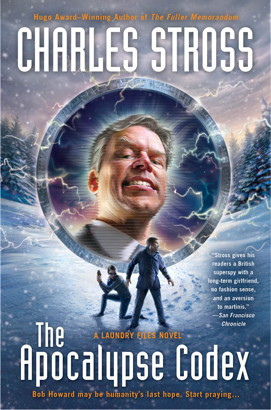
I'll begin with a couple references to previous blog posts: the first post details my work on Charles Stross's The Apocalypse Codex
 , book four in his Laundry Files series, for Ace Books. The second post excerpts, and links to, a couple reviews of this novel.
, book four in his Laundry Files series, for Ace Books. The second post excerpts, and links to, a couple reviews of this novel.In the intervening two months since that second blog post, The Apocalypse Codex has again been reviewed a number of times, and I would like to share with you a brief excerpt from just five of those reviews, in order of their publication. So, if you haven't picked up a copy of TAC as yet, if you're still undecided whether the Laundry Files novels are for you, then please read on; hopefully these reviews will help you decide that this series of books, and The Apocalypse Codex in particular, are a must read (and a must have).
I'll begin with the review by NancyO on oddly weird fiction (subtitled: "the fantasy, sci-fi and other weird books from my reading year"). What's so very cool about this particular review -- especially if you are new to the Laundry Files series -- is that NancyO reviews all four books in the series. So instead of focusing on TAC, I would like to quote from the introduction to her review:
There's something to be said about a guy who can combine HP Lovecraft, various writers of spy fiction, computer geekness and a little of the management nitwitedness of Office Space and come up with a series of consistently good novels that incorporate all of the above.... Along the way he throws pointed barbs at iPhones, cults, Power Point presentations, evangelical Christians, handguns and other sources of irritation -- all of which come off as funny, but only because you realize that some of the things he pokes sarcastic fun at resonate with your own fears, peeves, and annoyances. This guy is Charles Stross, who is the author of four books that comprise The Laundry Files, one of my favorite series of novels ever written. If you'll pardon the expletive, I don't know he manages to keep coming up with this amazing shit -- each book is different, sending the main character Bob Howard, computational demonologist, into perilous adventures as he and the Laundry, the super-secret civil service organization Bob works for, prepare to save humanity from the onslaught of CASE NIGHTMARE GREEN -- an apocalypse arriving from the multiverse. The people at the Laundry have developed some very modern and secret technologies that combine the most high-tech electronics with the occult to keep Bob and others like him safe to defend the world -- all based on magic as a form of mathematics. These novels remind me of old-time adventure stories with a hopped-up occult/geek/horror twist that for some reason unknown to myself I just can't seem to get enough of.I couldn't have asked for a better recap of the Laundry Files series. And as I said, NancyO goes on to review all four books in the series.
This next review of TAC is on mentatjack (subtitled: "sff book reviews and subversive ontology"). MentatJack writes:
Stross likes to play with point of view.... At the start of The Apocalypse Codex, Bob Howard (protagonist) is established formally as an unreliable narrator:The Apocalypse Codex isn't your typical spy novel, or Lovecratian novel, or geek/hacker novel, or any combination thereof, simply because of the style in which it is written, which is dependent on the point of view of the content at any point in the story: first person, second person, and third person.
If it happened to me, I'll describe it in the first person... If it happened to someone else I'll describe it in the third person… And if there's something you really need to understand... I'll [use second person.]
Bob tells us that in the prologue and then we're dropped immediately into a 3rd person section.... The super spy, Persephone, gives us a glimpse of what Bob is being trained to be.
Bob's accelerated training is a big part of the British defense against the future and it'll be interesting to see how Stross handles the inevitable "hell on earth" he’s forecasting. He does a great job with his central characters and the bits of insanity they encounter, but there's a distinct fog of war hovering over the rest of the world these stories are set in.
On The Dead Robots' Society Podcast (subtitled: "By aspiring writers, for aspiring writers"), here's an excerpt from Terry Mixon's review of TAC:
It seems Earth is reaching a tipping point. There are so many people on the planet that the level of computational power (living minds) has almost reached critical mass. The lines between our world and the other places where cold, powerful, alien intellects live have grown thin.... When things go from worse to threatening the end of life on Earth, Bob has no choice but to ignore his orders to withdraw and join forces with the contractors to try and prevent the end of the world. He has to go places that mortals were never meant to be and fight horrors that threaten his very sanity. If he comes out alive, that might not be a blessing.Our three intrepid agents, well, one Laundry agent and two external assets, are investigating one Raymond Schiller, head of the Golden Promise Ministries; Reverend Schiller has become a bit too cozy with some of the heads of the British government, and the Laundry has become involved because of certain rumors and reported activities. Reverend Schiller has taken up residence at the New Life Church in Colorado Springs, Colorado, where a "lovefest" has been planned, and the agents, of course, follow Schiller to Colorado, with the intention of intervening in this "lovefest" if necessary. [Note that British agents should not be operating on United States territory; note too that the US is the home of the dreaded Black Chamber, the nastier American equivalent of the Laundry.]
And the last review comes from Ian Simpson on the bookgeeks blog:
So why is this worth the read? There are three reasons. The first is Stross' writing. As in most of his prose, it is witty, inventive, geeky, and is a bit of a page-turner. The second is his imagination. There is a (cliché alert) Lovecraftian feel to the horror that unfolds, which is always welcome. However, all it is the mix of the supernatural (witches and demons, for example) and science fiction as its explanation (parallel dimensions and such like) that makes it feel fresh. Finally, and most importantly: the characters. They aren't the most original, but how they react is.I'm somewhat partial to that last line about the characters: They aren't the most original, but how they react is.
If you find the content I've excerpted from these reviews of interest or, as I said, you've been debating about whether or not to dive into Charles Stross's Laundry Files series, I have provided links to the full reviews. For me, the Laundry Files books are always a must read, but then, of course, I'm prejudiced....

Published on October 01, 2012 15:10
September 21, 2012
CrossMe Color app for Android
I have been remiss in posting on More Red Ink over the past few weeks. And therefore I must confess: I have become an addict. Yes, you read correctly! I have become addicted to an Android app, a game, called CrossMe Color on my Nexus 7 tab.
The game is available from Google Play and the Amazon App Store, and probably wherever else one might purchase Android apps. The cost for such an addiction is a mere $4.95; but let it be known that my addiction came to me free of charge: CrossMe Color was Amazon's free app of the day a couple weeks back.
I'm only on level two (Ashigaru), but there are eight levels (level eight being Shogun, or Expert, level) for a total of 150 puzzles.
The object of the game is to fill in the appropriate number of squares with the appropriate color, matching color and number of squares both horizontally and vertically. Here's the opening screen of the puzzle I just completed in level 2; this one is 25 by 25 squares, but many of the puzzles are rectangular.
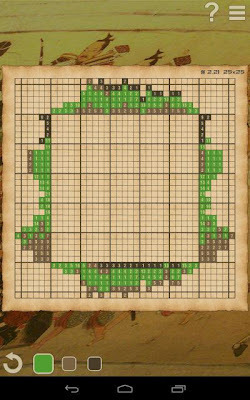
It actually looks more difficult than it really is, at least at this level; though a couple of the puzzles, so far, have been fairly trying. This one only has three colors, but I completed one just the other day that had five colors. Here's the completed puzzle:
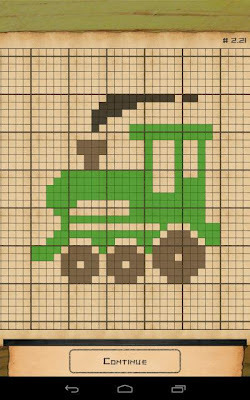
Note: Should you care to share in my addiction struggle, be sure to purchase the "Premium" $4.95 version of CrossMe Color. Otherwise, you will be sorely disappointed to discover the lack of color...regardless of the word "Color" in the title.
By the way, I tend to keep the sound off on my N7 when playing this game, but you might want to leave the sound on for the traditional Japanese music that accompanies the game play. And lastly, the developers promise future updates -- with more puzzles.
If you seriously want to check out this game, you can "test drive" it on the Amazon App Store.
Here's one more screen: a completed puzzle from the Expert level. I didn't complete this myself, rather I snagged the graphic from Amazon:
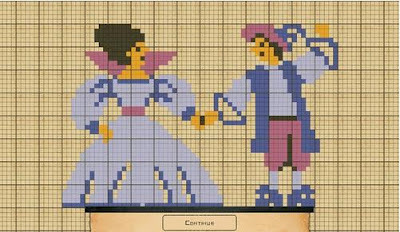
And when I'm not playing this game, or doing real work to pay the bills to allow me to play this game, I've been reading a dozen or so Android-related blogs and forums and ezines, trying to learn this new OS.


The game is available from Google Play and the Amazon App Store, and probably wherever else one might purchase Android apps. The cost for such an addiction is a mere $4.95; but let it be known that my addiction came to me free of charge: CrossMe Color was Amazon's free app of the day a couple weeks back.
I'm only on level two (Ashigaru), but there are eight levels (level eight being Shogun, or Expert, level) for a total of 150 puzzles.
The object of the game is to fill in the appropriate number of squares with the appropriate color, matching color and number of squares both horizontally and vertically. Here's the opening screen of the puzzle I just completed in level 2; this one is 25 by 25 squares, but many of the puzzles are rectangular.

It actually looks more difficult than it really is, at least at this level; though a couple of the puzzles, so far, have been fairly trying. This one only has three colors, but I completed one just the other day that had five colors. Here's the completed puzzle:

Note: Should you care to share in my addiction struggle, be sure to purchase the "Premium" $4.95 version of CrossMe Color. Otherwise, you will be sorely disappointed to discover the lack of color...regardless of the word "Color" in the title.
By the way, I tend to keep the sound off on my N7 when playing this game, but you might want to leave the sound on for the traditional Japanese music that accompanies the game play. And lastly, the developers promise future updates -- with more puzzles.
If you seriously want to check out this game, you can "test drive" it on the Amazon App Store.
Here's one more screen: a completed puzzle from the Expert level. I didn't complete this myself, rather I snagged the graphic from Amazon:

And when I'm not playing this game, or doing real work to pay the bills to allow me to play this game, I've been reading a dozen or so Android-related blogs and forums and ezines, trying to learn this new OS.

Published on September 21, 2012 16:01
September 12, 2012
Harper Voyager to Accept Unagented Manuscripts for Two Weeks in October

This is not something I typically post in and of itself; rather it would be more appropriate for my month-end Links & Things roundup. However, if I wait until the end of September (considering that I haven't tackled the lengthy August Links & Things as yet!), there would be insufficient time for readers to act. So... this information is courtesy of mediabistro.com's @galleycat email newsletter:
Publisher Harper Voyager, "the global science fiction and fantasy imprint of HarperCollins," will accept unagented -- and complete -- manuscripts for two weeks in October: from October 1 until October 14.
Note that manuscripts are being accepted during this two-week period for "digital publication." Here's more:
The manuscripts will then be read and those most suited to the global Harper Voyager list will be selected jointly by editors in the USA, UK and Australia. Accepted submissions will benefit from the full publishing process: accepted manuscripts will be edited; and the finished titles will receive online marketing and sales support in World English markets. Voyager will be seeking an array of adult and young adult speculative fiction for digital publication, but particularly novels written in the epic fantasy, science fiction, urban fantasy, horror, dystopia and supernatural genres.
The link above provides submission guidelines: please read these carefully and completely. Harper Voyager has even provided an online "submissions portal," which is not yet active, and probably won't be until October 1.
So finish up those manuscripts, and be sure to at least spell check your work! You have a wee bit more than 4 weeks until that cutoff date.
One final note: I have absolutely no connection whatsoever with Harper Voyager -- but should they be in need of an experienced editor, line editor, copy editor....

Published on September 12, 2012 17:10
September 11, 2012
September 11, 2012
Politics may divide us, but there are always those who will hate us specifically because we can and do argue so openly with one another. Freedom – especially of speech – has always been anathema to dictators, tyrants and ideologues. Let's not forget that on this of all days.—Dani Kollin
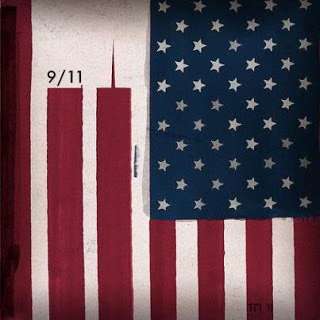
---------------
Dani Kollin, along with his brother Eytan, is the author of The Unincorporated Man, a Tor Books SciFi Essential book, which went on to win the 2010 Prometheus Award for Best Science Fiction Novel of the year. Their second and third novels, The Unincorporated War and The Unincorporated Woman, were also nominated for the same award. The Unincorporated Future, fourth in the series, was published in July 2012.

Published on September 11, 2012 16:28
August 26, 2012
"...think of Neil Armstrong, and give him a wink."
Published on August 26, 2012 17:21
One Giant Leap for Mankind....
Neil Alden Armstrong
(August 5, 1930 – August 25, 2012)


(August 5, 1930 – August 25, 2012)

Published on August 26, 2012 17:12

